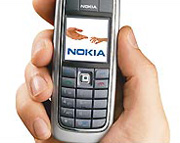|
 |
| Nokia sold more than 200 million phones in
2004 |
Think Finland - think business - and you may well come up with the name
Nokia.
From humble beginnings Nokia has risen to dominate the world market for
mobile phones.
When Fredrik Idestam set up business on the banks of the river Nokia in
Southern Finland, the telephone had not yet been invented.
It was 1865 and the firm started by making items such as toilet paper
and rubber boots. It expanded into other businesses, before deciding to
concentrate on electronics in the 1980s.
Nokia launched its first mobile phone, the Talkman, in 1984.
The machine was large and heavy by today's standards but the company
was sure one day everyone would want one.
That prediction proved correct.
Nokia sold more than 200 million phones in 2004, and last month
reported fourth-quarter, pre-tax profits of 1.46bn euros (£1bn; $1.9bn),
compared with 1.73bn euros in 2003.
That topped forecasts for a fall in profits to 1.3bn euros.
Nokia has always been a forward looking company, says David Wood, of
Symbian Technology.
"One thing they identified early on was the
fashion aspect of mobile phones, another thing was the focus on usability
."
At one point, Nokia controlled 37% of the global mobile handset market.
Profits and the share price swelled as a result.
Yet new competitors - especially those from Asia - started stealing
some of its market share.
The rivals were making phones with features and styles that Nokia could
not match - and at better prices.
Investors were disturbed, and Nokia's share price - which had risen to
heady levels in the technology boom - collapsed.
The share price continued its slide in 2004. Nokia's communications
director, Kari Tutti, admits it was a difficult year.
"At the beginning of the year we did lose some market share because we had some holes
in our portfolio and the competition brought some good products to the
market," he says. "But we have been able to regain some of that
market share."
(Agencies) | 